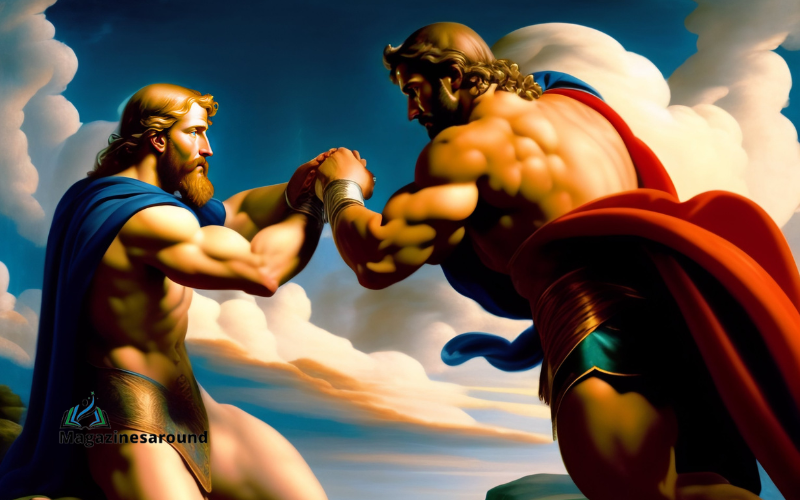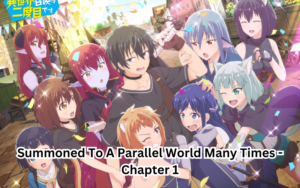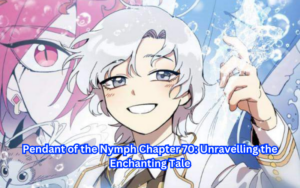
Reincarnation Of The Suicidal Battle God: Chapter 74
In Chapter 74 of “Reincarnation of the Suicidal Battle God,” a crucial turning point occurs in the protagonist’s life. The story follows a once formidable battle god who, in a past life, succumbed to despair and chose to end his life. The author skillfully weaves themes of redemption, self-discovery, and the consequences of actions.
Understanding Reincarnation In Mythology

What Is Reincarnation?
Reincarnation is the belief that a soul undergoes multiple births and rebirths, experiencing diverse lives in various forms. This cyclic journey is guided by Karma, where actions in one life influence the circumstances of the next.
Historical Beliefs In Reincarnation
The concept of reincarnation traces its origins to ancient civilizations such as Hinduism, Buddhism, and ancient Egyptian mythology. In these profound belief systems, souls embark on a journey of evolution across lifetimes, driven by the pursuit of enlightenment and self-discovery.
The Suicidal Battle Of God: A Mythical Tale
Origins Of The Suicidal Battle God
The tale of the Suicidal Battle God originates from an ancient civilization that worshipped fierce and powerful deities. The Battle God was revered for his extraordinary combat skills and his unwavering loyalty.
The Battle Of God’s Tragic End
Despite his might and valor, the Battle God experienced profound inner turmoil, leading to a tragic decision that would alter the course of his existence forever.
The Concept Of Reincarnation In The Tale
The Divine Cycle Of Rebirth
In this section, we explore how the concept of reincarnation is interwoven into the narrative of the suicide battle against God. The tale takes us through the Battle of God’s successive lives, each filled with unique challenges and opportunities for growth.
The Battle Of God’s Journey Through His Lives
As the Battle God undergoes reincarnation, we witness the evolution of his character, the lessons he learns, and the impact of his actions on those around him.
Symbolism And Metaphors In The Tale
The Dual Nature Of The Battle Of God
The Battle God’s character represents a duality of emotions, embodying both strength and vulnerability. We explore how this duality serves as a metaphor for the human experience of grappling with conflicting feelings.
The Battle Of God As A Representation Of Human Struggles
Beyond its divine façade, the Battle God mirrors the struggles that mortals face, making his tale relatable to human experiences of loss, redemption, and the pursuit of purpose.
The Popularity And Impact Of The Story
Cultural Significance Of The Suicidal Battle God

Through generations, the tale of the Battle God has become an integral part of cultural rituals, inspiring festivals, and artistic expressions.
Influence On Modern Literature And Media
In this section, we examine how the essence of the Suicidal Battle God’s story continues to inspire modern writers, filmmakers, and other creative minds.
The Perplexity Of The Suicidal Battle: God’s Tale
Analyzing Complex Themes
The tale presents multifaceted themes that resonate differently with each reader. We delve into these complexities and explore the underlying messages conveyed by the narrative.
Multiple Interpretations Of The Story
Given the richness of the Suicidal Battle God’s tale, it has spawned a myriad of interpretations, contributing to its enduring appeal.
Burstiness In The Narrative
Pivotal Moments In The Battle Of God’s Journey
The story unfolds through moments of intensity, where pivotal decisions shape the Battle God’s fate, illustrating the concept of burstiness in the narrative.
The Unpredictability Of Reincarnation
Reincarnation introduces an element of unpredictability to the story, making each life unique, and adding a layer of intrigue that captivates readers.
FAQS
Is The Suicidal Battle God A Real Deity From A Specific Mythology?
No, the Suicidal Battle God is a fictional character from an ancient tale that symbolizes various human emotions and experiences.
Does The Story Of The Battle Of God Hold Any Moral Lessons?
Yes, the tale imparts valuable lessons about inner turmoil, the consequences of actions, and the pursuit of purpose.
Are There Variations On The Tale In Different Cultures?
Yes, various cultures have adapted and interpreted the tale differently, enriching its narrative with diverse perspectives.
How Has The Tale Influenced Modern Popular Culture?
The story’s profound themes and relatable characters have influenced literature, movies, and art.
Is There Any Historical Evidence Supporting The Existence Of The Battle God?
No, the Suicidal Battle God remains a mythical figure rooted in storytelling and mythology.
What Are The Major Themes Explored In The Tale Of The Suicidal Battle God?
Major themes explored include human emotions, reincarnation, the cyclical nature of life, purpose, identity, destiny, and the impact of our actions.
How Does The Tale Of The Suicidal Battle Of God Resonate With Modern Readers?
The tale resonates with modern readers due to its exploration of universal themes and emotions that remain relevant throughout time. Readers can relate to the Battle God’s inner struggles, his search for meaning, and his journey of self-discovery, making the story deeply relatable despite its mythical origins.
Are There Any Significant Symbols Or Artifacts Associated With The Suicidal Battle God?
Yes, within the tale, certain symbols and artifacts hold significant meaning. For instance, the Battle God’s legendary sword, which represents his strength and prowess in battle, becomes a recurring motif throughout his various lives. Additionally, a mystical amulet is often mentioned, signifying protection and guidance on the Battle God’s journey through reincarnation.
How Does The Tale Of The Suicidal Battle Of God Address The Idea Of Redemption?
The tale touches on the theme of redemption through the Battle of God’s journey of self-redemption. As he experiences various lives and confronts the consequences of his actions, he seeks forgiveness and tries to find ways to atone for past mistakes. This element of seeking redemption adds depth and emotional resonance to the story.
What Impact Has The Tale Of The Suicidal Battle Of God Had On Spiritual And Philosophical Discussions?
Over the centuries, the tale sparked spiritual and philosophical discussions, exploring concepts like the soul, life, death, and moral implications. The story’s open-ended nature allows for diverse interpretations and philosophical debates.
Is The Tale Of The Suicidal Battle Of God Considered A Cautionary Story?
In some interpretations, the tale cautions against unchecked emotions, inner turmoil, and rash decisions, encouraging readers to reflect on potential repercussions.
Does The Tale Of The Suicidal Battle God Offer A Definitive Explanation For The Existence Of Reincarnation?
The tale doesn’t definitively explain reincarnation’s existence; it’s mythology and fiction. Instead, it’s a framework to explore the concept and its implications for the human experience.
How Has The Portrayal Of The Suicidal Battle God Evolved Over Time In Different Retellings?
Over time and across cultures, the portrayal of the Suicidal Battle God has undergone variations and adaptations. Some versions emphasize different aspects of his character, while others may alter certain events or encounters in his successive lives. These retellings add richness and diversity to the story, reflecting the cultural nuances and perspectives of different societies.
Are There Any Rituals Or Ceremonies Inspired By The Tale Of The Suicidal Battle God?
In certain cultures, the tale of the Suicidal Battle God has inspired unique rituals or ceremonies that pay homage to the character and the themes he embodies. These rituals often involve acts of bravery, introspection, and meditation, symbolizing the spiritual journey undertaken by the Battle God in his various lives.
What Lessons Can Readers Take Away From The Tale Of The Suicidal Battle God?
Valuable lessons in the tale: self-reflection, accepting vulnerabilities, pursuing purpose, actions’ impact on destiny, seeking redemption, and self-discovery.
Conclusion
The tale of the Suicidal Battle of God captures, explores human emotions, existence, and life’s eternal cycle. It delves into reincarnation, prompting readers to ponder life, death, the human psyche, and purpose.
Read More: Secretly Cultivate for a Thousand




